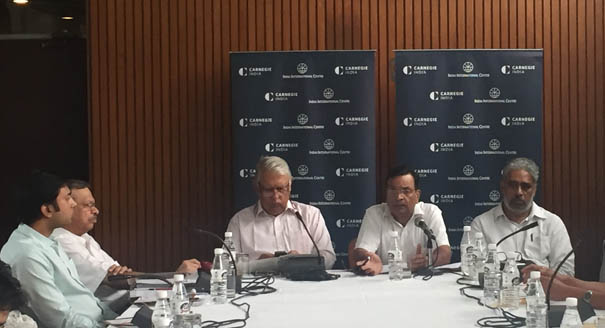Registration
You will receive an email confirming your registration.
Carnegie India, in collaboration with the India International Center, hosted a roundtable discussion on Sanjeev Tripathi’s recent Carnegie paper, “Illegal Immigration From Bangladesh to India: Toward a Comprehensive Solution.” The event was moderated by Pinak Ranjan Chakravarty, former Indian ambassador to Dhaka.
Illegal immigration from Bangladesh has been a key issue for India and has become a focal point in the 2016 assembly election in Assam. Participants at the event discussed the roots of the problem and the existing legal framework for refugee laws in India, and also brought in historical perspectives on subcontinental migration. The participants concluded that an efficient verification mechanism within a proper legal framework is required, not only to stop illegal immigration, but also to promote greater regional integration.
DISCUSSION HIGHLIGHTS
- The issue of illegal immigration from Bangladesh to India has been left unattended through most of independent India’s history, stated Sanjeev Tripathi, former Research and Analysis Wing (R&AW) chief. Waves of Bangladeshis left their country during the hostile conditions created by the partition of India in 1947, the India-Pakistan wars in 1965 and 1971, and the dissolution of East Pakistan in 1971, leading to more than 15 million immigrants entering India. This has had serious repercussions on Indian national security and has altered the demography of India’s northeastern states, where “locals feel overwhelmed by the outsiders,” Tripathi argued. Participants highlighted the fact that talks between India and Bangladesh on this issue invariably get derailed due to its politically sensitive nature. Bangladesh continues to officially maintain no illegal immigration exists, while many senior Indian officials state that immigrants from the neighboring country are populating Indian electoral rolls, spurring illegal trade, operating organized networks on both sides of the border, and selling large volumes of Indian cattle illegally.
- A number of attempts have been made to resolve the situation. The Assam Accord of 1985 envisioned that migrants from Bangladesh who entered India before March 25, 1971 could be absorbed by the Indian state, while those who entered subsequently would have their names deleted from the electoral rolls and be deported. Bilateral talks between the two countries are aiming for a solution in which both Bangladesh and India will take back their nationals living illegally in each other’s countries after a process of due verification. However, participants argued, none of these attempts have yet achieved a desirable result.
- Tripathi proposed a legal distinction between refugees and economic immigrants based on existing tenets of international law and stressed the necessity of having a national refugee law. To handle the refugees—those who have been victims of religious, ethnic, or political persecution—three possible scenarios could be possible: first, encourage their voluntary repatriation through incentives such as work permits and monetary allowances; second, grant Indian citizenship to those who meet certain guidelines to be worked out in the future; and third, resettle refugees in a third country. On the other hand, the immigrants—as opposed to the refugees—would have to be repatriated or resettled to prevent their further influx. A participant pointed out that this definition could lead to communal polarization, and that any such polarization would not be in India’s interest. Another noted that vote-bank politics in India has prevented any constructive solution, given that the two largest parties had either Hindus or Muslims as part of their core constituencies and would not work toward a cross-partisan solution fearing the alienation of their electoral support base. A third participant called for clemency, stating that embracing immigrants would be the most inexpensive and economically beneficial outcome for Indian trade and development.
- In their concluding remarks, the speakers reiterated the need to go beyond the partisan politics that have held back an India-Bangladesh settlement on the refugee question. Human rights, national security, and the sensitivity of locals, subcontinental integration, and a good neighborhood policy would have to be considered to hammer out a concrete and practical solution, concluded C. Raja Mohan, the director of Carnegie India.
The event summary was prepared by Niharika Kaul and Pratinav Anil, research interns with Carnegie India.
